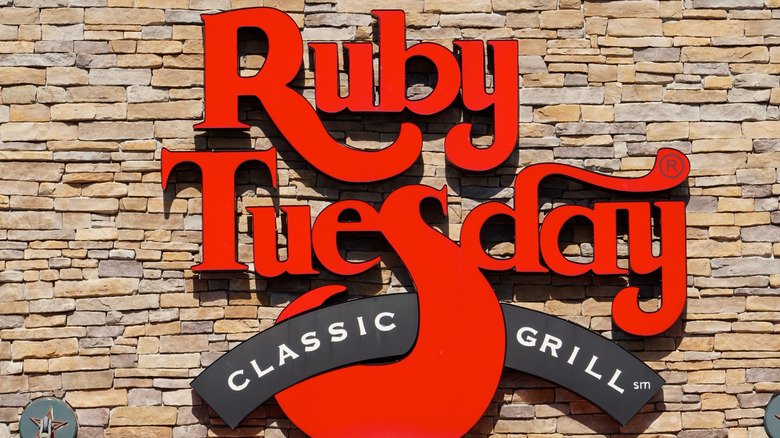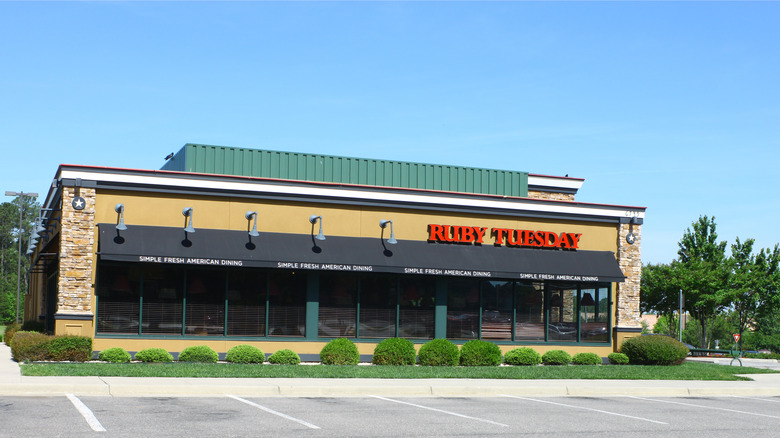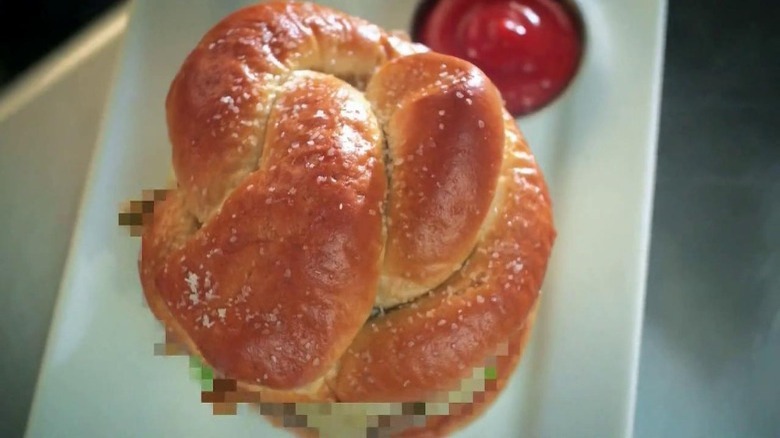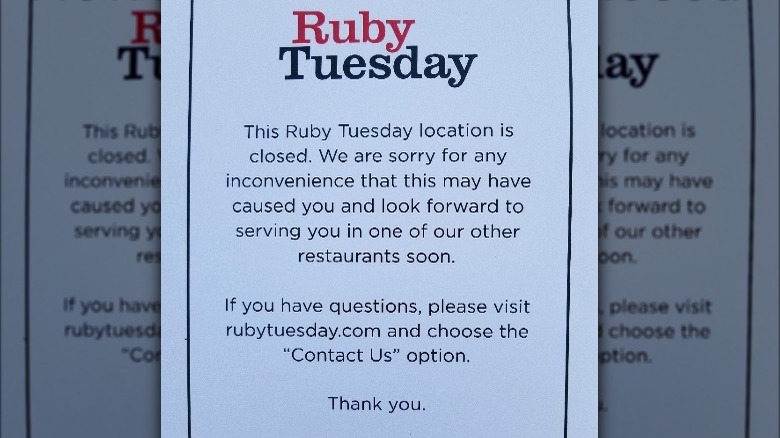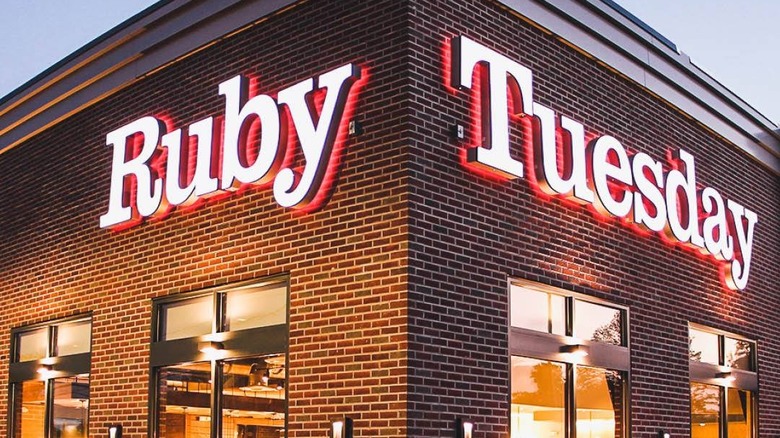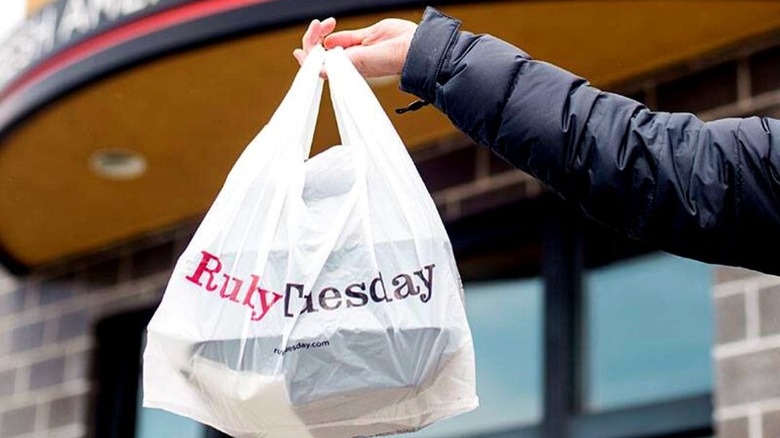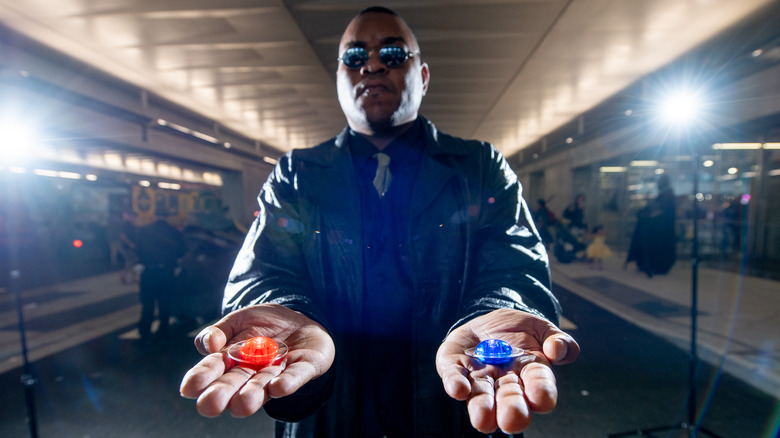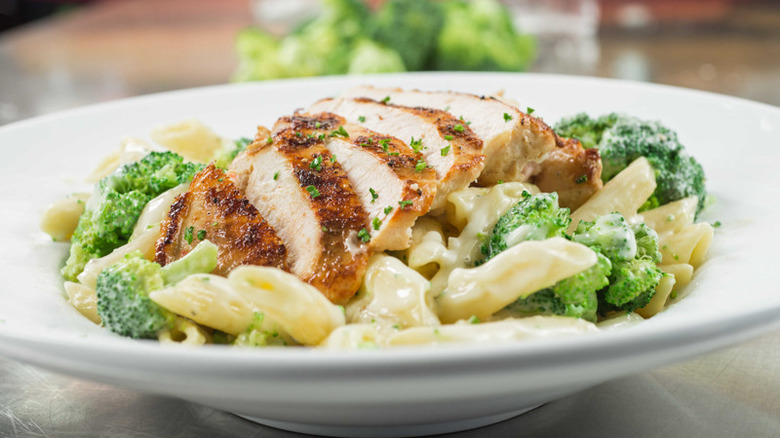The Biggest Scandals To Ever Hit Ruby Tuesday
Ruby Tuesday has been a staple American dining chain since it was founded in 1972 by Sandy Beall. The restaurant features classic American fare including burgers, fries, chicken, pasta, salads, sandwiches, wraps, desserts, and everything in between. Beall reportedly took $10,000 of his own money plus some dough borrowed from his fraternity brothers and launched the first Ruby Tuesday near their university campus in Knoxville, Tennessee (via Restaurant Business Online). Today, nearly 50 year later, there are over 600 Ruby Tuesday locations across the country and worldwide.
Simple enough for a restaurant's history, right? Unfortunately, while Ruby Tuesday has seen massive expansion since its early years, it has also weathered its fair share of scandal. Ruby Tuesday has been on both sides of some controversial lawsuits and has been accused of fairly shady business practices. The company has tried and failed to rebrand the restaurant, even attracting customers with wild theories about the occurrence of paranormal activities at the family-friendly location. Just how many scandals has Ruby Tuesday been at the center of? Let's take a look.
It sued a band with the same name
Ruby Tuesday is a global restaurant corporation which per MicroAxis, is valued at hundreds of millions of dollars. So you'd think a little-known Australian band with the same name would be no skin off its back, wouldn't you? Well, you'd be wrong. In 2018, Vice reported the company was suing a small group of musicians from Down Under for copyright infringement. Although the band said they couldn't really afford to fight the lawsuit, they believed the case had no merit. "[In] our opinion there is no case here," the band told Vice. "We had never heard about the restaurant chain before this. We got our name from the Rolling Stones song, as did they."
Oh yes, that. In case the irony wasn't clear, the name Ruby Tuesday originates from a song penned by Keith Richards of the Rolling Stones who explains in his autobiography that he wrote it in 1967 about a woman he once dated. Ruby Tuesday the restaurant chain took their moniker from the song without (as far as we can tell) consulting the band first or paying any royalties for use of the name. So Ruby Tuesday suing another band for stealing a name that had itself been stolen (or at least borrowed) from a famous song is pretty rich. In the end, the restaurant chain dropped the suit, scoring one for the little guy.
$100 million was spent on a failed branding upgrade
Although at one point Ruby Tuesday had 896 locations, founder Sandy Beall decided what his massive chain of restaurants needed was a little more class. Starting around 2007, he spent over $100 million in an attempt to rebrand it as an upscale establishment, reports the New York Times. Among the changes: the installation of faux-Tiffany lamps, new leather and wood banquettes, menu additions that included lobster, and suggested wine pairings to go with your meal. Servers and staff were also retrained in etiquette and hospitality. "If you really care what you put in your body, Ruby's is a good place for you," Beall told the NY Times.
Turns out, a lot of people didn't care. Although Beall initially dismissed a small drop in business, claiming Ruby Tuesday was only losing about 6 to 8% of its customer base as a result of the fancy makeover, the numbers eventually proved worse. Just a few years later, the pivot was officially deemed a failure. Beall was replaced with a new chief executive who, in the wake of disappointing sales, stated that Ruby Tuesday, "may have moved a bit too far from its heritage and core guest base," adding that "in our pursuit of a more upscale brand positioning we may have unintentionally overshot the runway." As a result, Ruby Tuesday's returned to its original, casual brand image. The lobster did however remain on the menu, and you can still order it at select locations.
It staged a lame marketing stunt by blowing up the wrong restaurant
Not only did Ruby Tuesday lose millions in its ill-fated attempt to elevate the brand, but it also proved it really didn't know its way around a successful marketing campaign either. In 2008, to usher in its new era as more of a fine-dining of establishment, Ruby Tuesday announced the destruction of one of its old locations in Ohio, literally blowing the building up to drive home the message: "It's a whole new Tuesday!" (via Grub Street). The explosion was even live-streamed on its website.
It was an idea with potential had it been smoothly pulled off. Instead, it ended up a clunky, confusing mess. As soon as the explosion occurred, reports began to circulate that Ruby Tuesday had blown up the wrong restaurant, accidentally destroying a different eatery called Cheeky's, next door. Or did it? Gawker then reported the entire event — including blowing up the fictional Cheeky's — was one giant fake-out. But a hoax intended to accomplish what, exactly? We still aren't quite sure. Adweek, a leading authority on marketing, declared the stunt a failure. The reactions on YouTube were mixed, and while some people were amused, others were seriously annoyed.
Its Fun Between the Bun campaign was straight-up embarrassing
The explosion gag gone wrong wasn't Ruby Tuesday's only cringe-worthy attempt at clever marketing. In 2013, it launched its "Fun Between the Buns" campaign, which introduced a new line of pretzel bun cheeseburgers with a hashtag and a national commercial that pixelated the full image of the burger itself, as if it were X-rated. The ad (via YouTube) was accompanied by the slow strum of an electric guitar that sure sounded like the soundtrack to an adult film. To see the full image of the cheeseburger in its uncensored glory, customers were directed to its website.
As the Dallas Observer noted, the campaign resulted in a pretty boring let-down. Instead of creating a major buzz, the biggest fire it appeared to stoke wasn't with consumers but with the Christian organization One Million Moms, who protested against the insinuation of nudity and indecency. Vice reports that in recent years, One Million Moms has also objected to Jennifer Lopez and Shakira's Super Bowl half-time show, actor Billy Porter's donning of a dress on "Sesame Street," and Cardi B. and Megan Thee Stallion's hit song, "WAP." So, in that sense, congratulations are in order Ruby Tuesday — you're finally part of the cool club.
It reportedly closed restaurants without notifying its workers
Countless restaurants have gone out of business as a result of the COVID-19 pandemic. In addition to filing for Chapter 11 bankruptcy protection, Ruby Tuesday was forced to close 185 locations, according to USA Today. Unfortunately, along with closings come layoffs. What's shocking about Ruby Tuesday's layoffs is that some of its employees reportedly weren't given any advance warning. In fact, this was not an uncommon occurrence prior to the pandemic.
"If a store is shutting down permanently, Ruby Tuesday never, ever, ever, ever gives notice to anyone," one staffer at a Missouri location told Business Insider. "The district manager will call the general manager literally the night before and say, 'Hey, you're being shut down. Tonight is your last day of being open. Don't tell anyone until tomorrow.'" In the same Business Insider story, staffers at Ruby Tuesday in different cities backed up this claim, recounting their shock and disappointment upon learning their location had closed without giving them much — if any — advance notice. A server based in Philadelphia attested: "They put a sign on the door, and you come to work, and you realize you have no job."
A job applicant sued for age discrimination
Getting turned down for a job sucks, but how about being rejected because you're told you're too old? Sucky and illegal! That's what Floyd Cardwell, a qualified job applicant with two decades of experience in the food and beverage industry, claims happened when he was rejected for a job at a Ruby Tuesday restaurant in Boca Raton, Florida (via Orlando Sentinel). After being informed he wasn't chosen for the role because he wouldn't "maximize longevity," Cardwell sued the company for age discrimination in 2017.
Ruby Tuesday ultimately settled the case according to The National Law Review, paying Cardwell $45,000 in damages and agreeing to make changes to its hiring policies in an effort to promote age-inclusiveness. But it wasn't the first time Ruby Tuesday was sued for discriminating against older job applicants. In 2013, Ruby Tuesday paid $575,000 to a group of plaintiffs in the midwest who claimed the company had shown a pattern of ageism at six of its locations by rejecting applicants who were 40 years of age or older (via U.S. Equal Employment Opportunity Commission).
It was also sued for sex discrimination
In addition to alleged age discrimination, Ruby Tuesday has been sued for gender discrimination. According to The Washington Post, in 2015 two employees — Andrew Herrera and Joshua Bell — who worked at different Ruby Tuesday locations, applied for what was described as a "lucrative" temporary gig: a summer job at Ruby Tuesday in Park City, Utah. The internal job listing promised an opportunity to make good money based on Park City's popularity as a warm-weather travel destination, plus housing would be provided. Herrera and Bell both applied but were turned down, reportedly because as two men, housing them along with the female employees would likely be more costly and complicated for the company. Ruby Tuesday ended up hiring several women for the positions, but no men.
The men sued. "Mr. Herrera was a longtime employee of Ruby Tuesday who had regularly trained new hires at the Corvallis restaurant," a representative for the Equal Employment Opportunity Commission (EEOC) said in a statement obtained by The Washington Post. "He was shocked and angered that Ruby Tuesday would categorically exclude him and other male employees from a lucrative summer assignment based purely on stereotypes about his gender. The company could have addressed any real privacy concerns by providing separate housing units for each gender in Park City, but chose an unlawful option instead." According to the EEOC, Ruby Tuesday settled the case for $100,000.
It's the location of a remarkably bizarre Internet story about a glitch in the universe
Are you sitting down? Comfortable? Good, because this one is a doozy. Years ago, an unknown user posted a tale online that defies belief. To make a long story short, in 2009, the author and their brother embarked on a road trip from Oregon to Florida. On the trip back, they experienced a series of bizarre events — including an eerie encounter at a Ruby Tuesday somewhere in New Mexico — that could only be attributed to the paranormal in their minds. First, their gas tank emptied at an abnormally fast pace, causing them to stop in a random town where they dined at the popular chain. Upon walking in, everyone at the restaurant seemed to recognize the brothers, greeting them warmly even though neither had ever stepped foot in the place before. Maybe it was misidentification, the author mused, or maybe it was indeed some sort of universal glitch.
The post became a hot topic on Reddit, sparking multiple theories about what may have actually happened. One commenter guessed the brothers were spies whose memories had been wiped because of a massive discovery they had made. Another floated the theory that perhaps they had accidentally driven through a portal into a parallel universe. Yet another posited that it had perhaps all been a dream. Several people surmised a less exciting (but frankly, more realistic) possibility: It was simply a case of mistaken identities.
It was accused of shirking its employees of pay
In 2012, two employees filed a lawsuit in federal court accusing Ruby Tuesday of denying them overtime. The plaintiffs alleged their job descriptions required them to complete a number of tasks during their shift at work, but that they weren't paid for the total amount of time it took to get it all done. This opened the door for a class-action suit on behalf of 4,000 employees also claiming unpaid overtime. The matter was settled three years later, and Ruby Tuesday agreed to pay $3 million, which reportedly included over a million dollars in legal fees. Had Ruby Tuesday coughed up the overtime in the first place, we're guessing it might have been a lot cheaper.
Several similar lawsuits followed, alleging that Ruby Tuesday did not compensate employees for the total amount of time they spent working on tasks that fell outside of their normal shift or beyond their expected duties. In 2016, a Chattanooga-based server claimed that Ruby Tuesday failed to pay servers and bartenders for time spent doing side work, such as making coffee and placing silverware. Again in 2017, a bartender working at the restaurant's Times Square location in New York City sued as well, claiming she wasn't paid the appropriate legal wage for doing non-bartending jobs like making bread, packing-to-go orders, and wiping down surfaces.
The chain attempted to withhold retirement money from its former employees
As mentioned, Ruby Tuesday filed for Chapter 11 bankruptcy and closed 185 locations in 2020 as a result of declining business due to the pandemic. At the time of the filing, Restaurant Business Online reported the company owed a specialized set of retirement perks and bonuses (known as "rabbi trusts") to a group of former executives worth about $22.5 million. Since it had declared bankruptcy, Ruby Tuesday argued the company didn't have to pay. Not to mention, the company claimed it needed that cash to help stay financially afloat. Several of the retirees sued, alleging that the funds were not Ruby Tuesday's to keep, especially since the restaurant hadn't declared bankruptcy until the fall of 2020, whereas the payments had been due months earlier, excluding the money from the protective window bankruptcy provided.
The headlines certainly weren't a good look in terms of public relations, with Business Insider declaring that Ruby Tuesday had essentially left retirees "scrambling amid the pandemic." The court filings also noted that many of the plaintiffs were over 80 years old and relied on the money for vital living expenses. By December 2020, the two sides announced settlement discussions were in the works, with both parties pledging to "engage in good faith discussions." Finally, at the start of 2021 Ruby Tuesday announced in a press release that thanks to the bankruptcy filing, it was financially back on its feet.
It featured one of the most unhealthy menu items ever
Forget the lawsuits, Ruby Tuesday's biggest crime may have been against the arteries of any customer who ordered one of its signature dishes, "Fresh Chicken and Broccoli Pasta." It may sound harmless, maybe even healthy, but in 2007 Reuters revealed its astronomical nutrition figures: 2060 calories and 128 grams of fat. It's worth noting that is more calories than the average person might eat in an entire day and way over the limit of daily recommended fat intake for a woman or man. One doctor even dubbed the dish "Angioplasta," inferring it's so unhealthy, it may end up requiring heart surgery.
In 2018, a law was passed requiring chain restaurants with more than 20 locations to list their calorie count on the menu. So while you can still find a version of the dish on today's menu, the recipe appears to have been tweaked to be slightly less indulgent. Even so, it still clocks in at a hefty 1,439 calories per serving, with a menu admission that "most of those calories come from fat (58%)." It should come as no surprise that among the healthier options recommended if you're dining at Ruby Tuesday, the chicken and broccoli pasta dish is definitively still a no-go. Instead, the experts at Verywell Fit recommend the chicken carbonara, grilled salmon, or even a half order of the half-rack, baby-back ribs.
